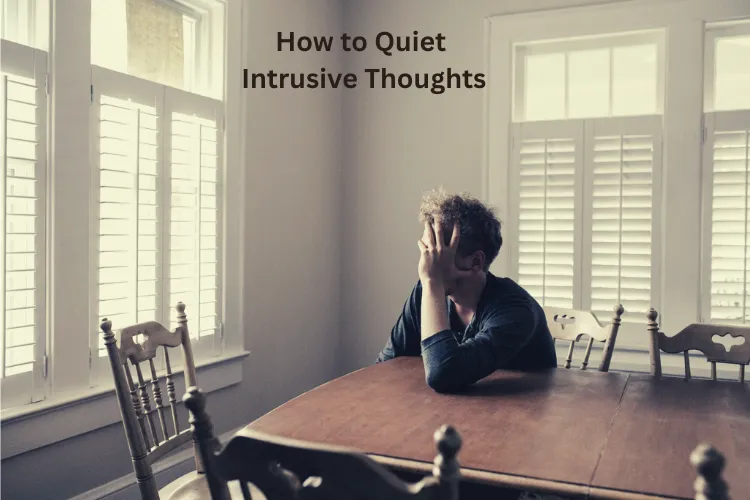You are in the middle of a task and suddenly you’re interrupted by thoughts like:
Will my work get sanctioned? Have I submitted my task to the right person? Did I get the email address correct? Am I doing well enough? Am I giving out too much information? Do you ever wonder what these thoughts are and why are they coming to your mind all of a sudden?
A common term for these kinds of involuntarily produced thoughts is “Intrusive Thoughts”.
What are Intrusive Thoughts: Meaning
Information related to the unwanted thoughts is present somewhere at the back of your mind (in your subconscious mind) and it tends to come at the surface when either these thoughts are too strong to tackle or when you are not completely focused on the task at hand. They seem to pop up from thin air. Generally, you can ignore these thoughts and carry on with the work but sometimes they just keep popping in your head and get stuck. All individuals experience this from time to time. It can range from having impulsive thoughts about some decision to getting violent, inappropriate thoughts or intrusive images.
Types of Intrusive Thoughts
Common intrusive thoughts cross almost everyone’s mind on a daily basis. Examples of intrusive thoughts can be as follows:
- Apprehensions about catching an illness
- Fear that you’ll say or do something embarrassing
- Having bad thoughts about hurting someone
- Wondering if you turned off the stove, shut the door, or delivered your SMS message to the correct individual
- Unwanted sexual thoughts
- Unexpected recollections of upsetting prior experiences
People with Post Traumatic Stress Disorder can experience intrusive thoughts when there is an environmental trigger regarding their trauma. Intrusive Thoughts are also associated with Obsessive Compulsive Disorder. People diagnosed with OCD may fall under the theme of Ruminations and Intrusive Thoughts. These are further classified under: Relationship Intrusive Thoughts, Sexual Intrusive Thoughts, Magical Thinking Intrusive Thoughts, Religious Intrusive Thoughts, Violent Intrusive Thoughts, and Body focused obsessions.
Our mental wellness experts can equip you with quite a few skills to deal with day-to-day stressors.
Myths and Clarifications about Intrusive Thoughts
People often hold certain myths about intrusive thoughts that need to be addressed in order to deal and get rid of these thoughts.
- My thoughts say something about who I am as a person: Human brain generates almost 6200 thoughts per day. Not all your thoughts might be relevant or accurate. Hence, not all your thoughts define you as a person.
- I should be able to control all my thoughts: You cannot control everything. Sometimes you just have to identify the thoughts and actions that aren’t in your control and let go of them.
- Acting on unsettling ideas is just as awful as having them: Some thoughts are fleeting and unimportant. You might have multiple of such thoughts but what matters is how you choose to act or ignore those thoughts. Unless you act on those thoughts, they aren’t something that you need to pay a heed to.
Download Our App to know more about Intrusive Thoughts and effects in your daily life.
Overcoming Unwanted – Intrusive Thoughts
Intrusive thoughts are often disturbing thoughts, and they can take a form of obsessive thoughts if they occur in excess and interrupt the flow of an activity drastically. These obsessive thoughts bring along a plethora of negative experiences, some of which include discomfort, anxiety, uneasiness, fear, apprehension, and worry.
“You don’t have to learn how to control your thoughts, you just have to learn to stop letting your thoughts control you!”
You might want to stop getting these intrusive thoughts in order to bring your mind to calm down or at peace. Dealing with intrusive thoughts can be tricky.
Some psychologists suggest that Intrusive thoughts can be thought of as “Junk Thoughts” generated by our mind. They can be discarded by not paying much attention to them since they’re usually not true. Be aware that having an odd or unsettling idea does not always mean that you have a mental health problem. Give yourself time to let these thoughts disappear. Moreover, don’t suppress them or you might find yourself even more fixated.
Having said that, if disturbing thoughts keep on re-occurring then it should be thought of as a sign that some issue has not been dealt with. The crux of the problem can be identified by delving deeper into such kind of thoughts. Careful attention then needs to be paid to rectify the unresolved situation if it interferes with your daily life.
“Only when you let go of unimportant stuff, will you be able to focus and find meaning in the stuff that truly matters.”
Cognitive Behavioural Therapy helps to deal with intrusive thoughts. Our Wellness therapists & counselors at Ganeshaspeaks.com can help you.



